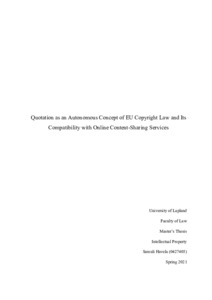Quotation as an Autonomous Concept of EU Copyright Law and Its Compatibility with Online Content-Sharing Services
Havela, Samuli (2021)
Havela, Samuli
Lapin yliopisto
2021
Julkaisun pysyvä osoite on
https://urn.fi/URN:NBN:fi-fe202102255978
https://urn.fi/URN:NBN:fi-fe202102255978
Tiivistelmä
This thesis argues that ’’quotation’’ is an autonomous concept of EU law and presents rigorous, in-depth analysis of the quotation copyright exception in article 5(3)(d) of the Information Society Directive. It examines not only the term ’’quotation’’, but also the conditions, the terms, and the expressions used in article 5(3)(d). Furthermore, the thesis evaluates the quotation exception’s compatibility with online content-sharing services as they are understood in article 17 of the Digital Single Market directive. The goal is to identify any short-comings that the quotation exception might have in relation to the user-generated content typically encountered in these services. The thesis uses the analytical legal dogmatic method of research.
The thesis finds that the concept of ’’quotation’’ in EU law evidently covers all types of works, such as literary, musical and photographic works. It can also be lawful to quote works in their entirety, not just short extracts from works. The quotation exception is also welcoming of new methods of quotation made possible by technology, such as hyperlinking. Still, the thesis concludes that the quotation exception’s compatibility with online content-sharing services is troublesome. The requirement of ’’dialogue’’ between the quoting and the quoted work may disqualify certain categories of works. Uncertainty around the requirement of indicating the author’s name may also hinder creativity. The quotation exception as it stands may restrain the proper functioning of the internal market and stifle with stimulation of creativity and innovation in the digital age.
The thesis finds that the concept of ’’quotation’’ in EU law evidently covers all types of works, such as literary, musical and photographic works. It can also be lawful to quote works in their entirety, not just short extracts from works. The quotation exception is also welcoming of new methods of quotation made possible by technology, such as hyperlinking. Still, the thesis concludes that the quotation exception’s compatibility with online content-sharing services is troublesome. The requirement of ’’dialogue’’ between the quoting and the quoted work may disqualify certain categories of works. Uncertainty around the requirement of indicating the author’s name may also hinder creativity. The quotation exception as it stands may restrain the proper functioning of the internal market and stifle with stimulation of creativity and innovation in the digital age.
Kokoelmat
- Pro gradu -tutkielmat [4928]
